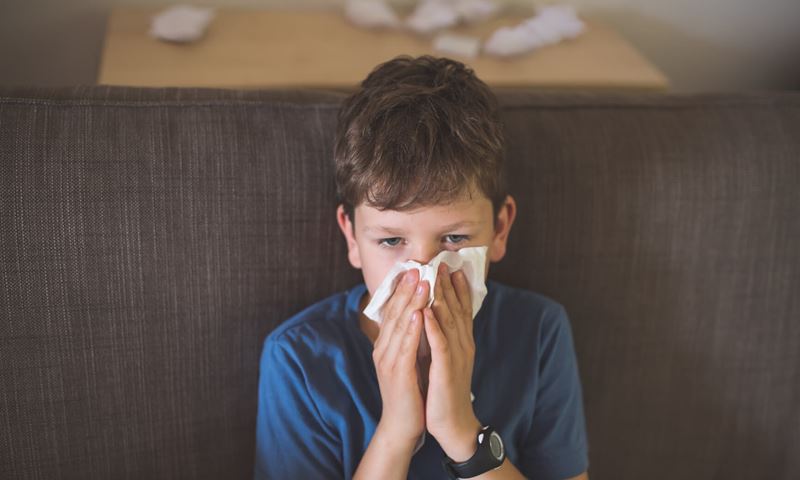The seasons are changing and that means flu season is just around the corner. While you’re bringing out your cool-weather wardrobe it’s also a good time to consider booking in for your annual flu shot. Influenza viruses evolve much like fashion with the changing seasons, making it important to stay current with your immunity.
Timely vaccination is the best protection against influenza, and the most important way we can reduce the number of flu infections and flu-related deaths. Despite this, there are still many misconceptions about getting the flu vax.
Here we run through your burning questions about the flu vaccine and dispel some common myths.
What is the flu?
Influenza or ‘the flu’ is a very contagious infection of the airways that causes widespread illness and, in some cases, chronic medical conditions or death. In the 2023 influenza season in Australia, there were 252,296 cases of the flu confirmed, with 3,696 hospital admissions for those in a serious condition. It is possible to catch the flu year-round, but this viral respiratory illness is most prevalent in the cooler months.
How serious is the flu? Isn’t just a bad cold?
The severity of the flu varies, and, in most cases – particularly if you’re young and healthy, while not fun and might ruin some plans, it is not a serious illness.
Symptoms can include:
- fever or chills
- headache
- fatigue
- runny or blocked nose and sneezing
- aching joints or muscles
- fatigue
- upset stomach or diarrhoea
- loss of appetite
Most symptoms will resolve within ten days and without any treatment, but the flu is still a significant cause of illness in Australia and can lead to:
- bronchitis, croup or pneumonia
- ear infections
- heart and other organ damage
- brain inflammation and brain damage
People with serious cases of the flu may need to go to hospital and have extended time off work or periods needing care and assistance.
Am I at risk of getting the flu?
Everyone is at risk of getting the flu, particularly if they live or work in close contact with others. For this reason, immunisation is recommended for everyone over the age of 6 months to help control the spread in the community, and particularly for those who have an underlying medical condition or reduced immunity.
How often should I get a flu shot, and when is the best time to do this?
Flu viruses are constantly evolving, which means that the composition of vaccines developed to prevent serious infection must also change to respond to the viruses that are circulating in the population. The dominant strains of influenza vary year on year which means that the best way to ensure you’re protected is to have a new flu vaccine before the start of each flu season.
Another thing to keep in mind is timing, as the effectiveness of the vaccine diminishes gradually. If you have a flu jab in April or May this should provide protection over the peak Australian flu period which generally runs from June to September.
Will the flu vaccine give me the flu?
Contrary to popular belief, the flu vaccine used in Australia cannot cause the ‘flu’. It is inactive and does not contain a live virus.
You may experience some side effects that resemble flu symptoms such as fever, fatigue and muscle aches but these indicate that the vaccine is working and has triggered an immune response in your body. Symptoms should subside within a few days, so if they linger longer than this it is important to see your doctor.
Does the flu vaccine stop me getting the flu?
No vaccine is 100% effective, but the high level of protection that the flu shot provides makes it a worthwhile annual vaccination. Importantly, it can also reduce the severity of symptoms and complications in those who do catch the virus.
The flu is highly contagious, so other measures to reduce your risk of catching or spreading it include:
- regular and thorough hand-washing
- avoiding contact with people who have the flu
- staying home while you’re unwell
- wearing a face mask if you must go out in public
- avoiding sharing linen, water bottles, eating utensils and dishes with those you live with
- using a tissue when you cough or sneeze, dispose of it immediately and wash your hands
- ‘catching’ your cough in your sleeve or elbow
For more information about how to prevent, identify and manage the flu, visit:
- The Australian Government Department of Health and Aged Care
- National Immunisation Information Line 1800 671 811
- Better Health Channel
I’m allergic to eggs – can I still have the flu vaccine?
People with an egg allergy can still have the flu vaccine safely, although it is recommended that you get your flu shot in a medical facility where there are doctors and nurses on hand who are experienced in recognising and treating anaphylaxis.
There are other medical reasons not to have a flu vaccine, and these include:
- anaphylaxis after a previous dose of the flu vaccine
- previous anaphylactic response to another vaccine component
- sensitivity or allergy to latex excludes a certain type of vaccine. Talk to your doctor for more information.
Can I have the flu and COVID-19 vaccines at the same time?
Yes! COVID-19 and influenza vaccines can be co-administered (given on the same day). Studies show that this is safe and produces a good immune response. Keep in mind that the COVID-19 vaccine does not protect against the flu and vice-versa – these illnesses are caused by different viruses. Learn more about COVID-19 vaccines.
Will antibiotics help to ease symptoms?
The flu is caused by a virus, which means that it will not respond to antibiotics. If you suspect you’ve caught the flu, speak with your doctor. They can check your symptoms and ask about contact with others. They may take a nose or throat swab, or a blood sample, to test for influenza. This helps health officials track disease patterns.
Your doctor will provide advice for recovery, and it is important to follow this closely. Getting plenty of rest, keeping warm and comfortable, keeping up fluids to prevent dehydration and eating immunity-boosting foods are usually recommended. Paracetamol or cold and flu medicines can also help to ease discomfort.
Is the flu shot free?
Flu vaccines are included on the National Immunisation Program (NIP) for groups that are at greater risk of complications from contracting the flu. These include:
- people aged over 65
- pregnant women
- children aged from 6 months to 5 years
- Aboriginal and Torres Strait Islander people aged 6 months and older
- People with certain medical conditions such as heart disease, diabetes or kidney disease
Some workplaces run annual vaccination programs and offer free or subsidised flu vaccines for their employees.

Where can I get a flu shot?
Flu vaccines are generally available at your local doctor’s clinic or pharmacy from April each year.
Talk to your GP, community health centre, Aboriginal medical services or local immunisation provider for more information about how to access the flu vax.



